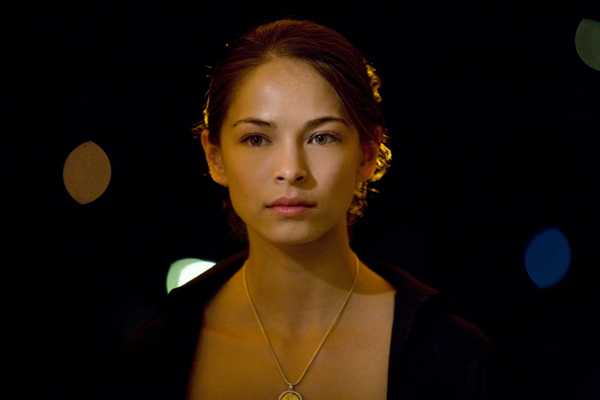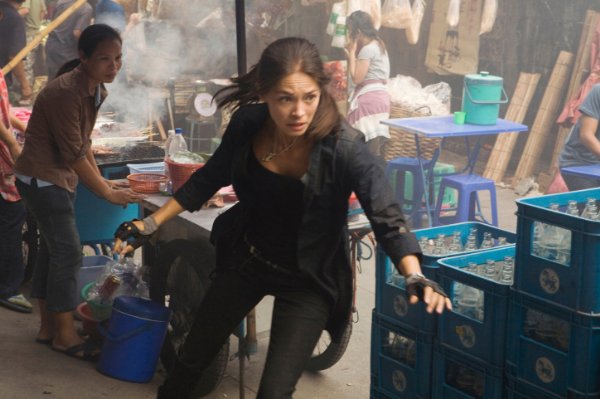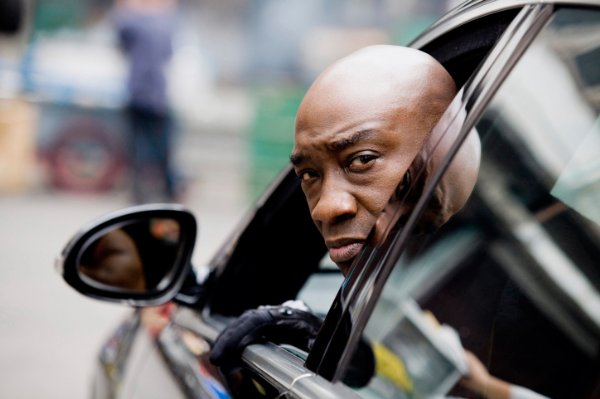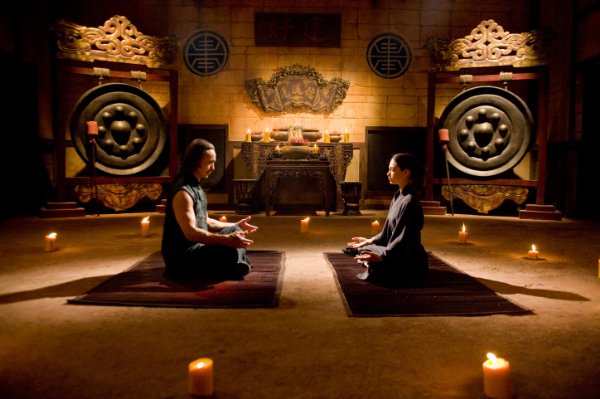
When you think about it, there’s no earthly reason why movies based on video games should, as a class, be so atrocious. For one thing, the games themselves are largely cinematic in conception and style; the biggest problem of most adaptations from other media — of imposing a three-act framework on material that lacks structure — is largely absent, since the source game is most often already organized as a series of escalating encounters. Backstory and characterization, however rudimentary, are already in place. And coming from such a design-intensive medium, game-based movies arrive pre-packaged with a deep sense of environment, of atmosphere. The ingredients for success are in place.
And yet, the record speaks for itself. The history of the genre is a grim slog of tax-shelter flops, assembled by Eurohacks for a one-weekend audience of insomniacs, craphounds, and ever-hopeful fanboys. Into this parade o’ crap now steps Street Fighter: The Legend of Chun-Li, dropping straight to DVD this week. A spin-off from the Capcom game (and a sequel or prequel or perhaps paraquel to 1994’s Street Fighter, featuring the once-in-a-lifetime pairing of Van Damme and Raul Julia), Legend has already — though the year is scarce half-over — been branded by several critics as the worst film of 2009.
And I, um — I kind of liked it.

Maybe it’s the soft bigotry of low expectations at play, but I found Legend of Chun-Li to be good dumb fun, an unassuming little chopsockey romp just right for whiling away a rainy Saturday afternoon. Too often, videogame movies are unable to successfully capitalize on the strengths of the properties, but are bogged down by their needlessly convoluted mythologies. I’ve never played the Street Fighter series — my videogame experience basically begins and ends with Pong — but I do enjoy a good hai-yah movie, and Legend pushed my buttons right.
The plot is an enjoyably silly fizzgig of martial arts clichés and half-assed mysticism. Young Chun-Li is raised in Hong Kong by her devoted father (Edmund Chen), a high-rolling businessman who nonetheless has ample leisure hours to teach his little girl some bitchin’ kung fu moves. But while Chun-Li is still a child, Daddy Dear’s shady past comes back to roundhouse-kick him in the face; he keeps tryin’ to get out, and they keep pullin’ him back in — “they,” in this case, being the sinister Bison (Neal McDonough, Tin Man) and his right-hand gorilla Balrog (a slumming Michael Clarke Duncan). They make Pops an offer he can’t refuse, and he vanishes, leaving little Chun-Li bereft.

Chun-Li grows up into the very watchable Kristin Kreuk and finds success as a concert pianist. As viewers of Jet Li’s classic Danny the Dog (a.k.a. Unleashed) well know, classical piano is the absolute polar opposite of a life of kung fu fightin’ — yet Chun-Li is drawn into a career of ass-kickery by a mysterious scroll that summons her to Bangkok, where she meets the legendary master Gen (Robin Shou), a former associate of Bison, now his sworn enemy. In the clip below, Gen shares his wisdom with Chun-Li, giving her the training she will need for her final showdown with Bison, who not-so-coincidentally has also set up shop in Bangkok — and Bison, as it turns out, must confront his own mysterious past before the movie is over.
streetfighter_film_without-senses.mov
And that’s about it. Oh, there are complications, and goons to fight on the way to the Boss Level, and there’s a by-the-numbers B-story with an Interpol agent WHO DOESN’T PLAY BY THE RULES! and a Thai cop AS TOUGH AS SHE IS BEAUTIFUL! who are also trying to nail Bison while simultaneously stamping out king fu vigilantism; but Chun-Li’s training and her quest for vengeance provide a clear narrative through-line. You can leave the DVD running for ten minutes while you go to the kitchen and fix a sandwich, and you’ll have no trouble getting up to speed upon your return.

Simplistic stuff, yeah — but, y’know, Ong Bak wasn’t exactly Anna Karenina, either. What matters here isn’t the nuances of plotting and pacing, but the primal rush of the action scenes. And here, Legend does not disappoint. Director Andrzej Bartkowiak, who helmed the 2005 adaptation of Doom, caught a lot of flak for fucking up that movie’s action set-pieces — and let’s face it, why even make a Doom movie if not for the action set-pieces? — but he’s got a sure hand and a keen eye here. There’s less gun-porn and more fantasy, with wuxia-style wire work galore, and fight choreography that takes full advantage of the glass-topped tables and picture windows so ubiquitous to martial arts films. It’s nicely shot, with some gorgeous location work in Thailand, and staged with an unhinged energy. By the time that guy from the Black Eyed Peas shows up sporting Wolverine-style claws and a Doctor Doom mask, I had surrendered to the movie’s berserk enthusiasm.
Street Fighter: The Legend of Chun-Li has its share of flaws, of course — mostly in the script. The THEY FIGHT CRIME! subplot grows tedious after a while, and the film runs into trouble applying game logic to a film narrative — Chun-Li abandoning her career and her life of privilege on the say-so of an ancient scroll as interpreted by a crazy old street vendor, for instance, might be acceptable in the context of a game, as a cut-scene inserted to bridge a change in locations; but it doesn’t make a gaddam lick of sense played out on film. Also, having the villain’s masterplan turn out to be a real-estate scheme really only works if your villain is Gene Hackman as Lex Luthor; otherwise, it seems kind of low-stakes.

And though the direction is light-handed, the dialogue is leaden. It communicates the requisite information efficiently, but there’s no spark to it, no color, none of the joy of language; doggedly literal, the dialogue plays out like translated subtitles — all flat and declarative. Without a strong script to inspire them, the actors are all over the place. Bison’s Irish accent keeps lapsing and reappearing, while poor Michael Clarke Duncan seems slightly disappointed throughout — he’s rarin’ to go for this great tough-guy role, but the script never gives him anything cool or badass to say or do. He mostly answers the phone and delivers bad news to his boss. For his glory moment, Duncan fires a rocket-propelled grenade, blowing up Gen’s hideaway — and his big line is “Give me that, I’ll do it myself.” Not exactly “Say hello to my little friend,” or even “Yippee-ki-yay, motherfucker,” now, is it?

Then again, what’s the alternative? Would you even want a David Mamet rewrite for Enter the Dragon? How much color can one movie take, anyway? And if Kristin Kreuk is a little blank, well, what of it? Tony Jaa’s no master thespian himself, and Jet Li — well, let’s just say that some of the boards that Jet breaks can out-act him. Kreuk acquits herself well in the action scenes; while it’s impossible to believe in Chun-Li as a character, her speed and power seem real — realer than Zhang Ziyi’s ungainly, fractionally-too-slow moves in Crouching Tiger Hidden Dragon, anyway.
A more serious reservation comes in the way that the film uses violence against its female characters as a shorthand for establishing just what an amoral monster the bad guy is. (Comic book fans may recognize this as the “Women in Refrigerators“ syndrome.) In one blink-and-you’ll-miss-it scene, Bison suspends a bound woman from the ceiling and literally uses her as a punching bag; in a flashback he pins down his pregnant wife and rips the child from her womb. It’s counterbalanced somewhat by the strong characters of detective Maya (Moon Bloodgood) and of Chun-Li herself, but that streak of objectification — of a woman being of primary importance as a means for a man to show his true character in his treatment of her — is still distasteful. It’s a damn sight better than the first act of Kill Bill, which teats its heroine to literally years of systematic degradation to very little dramatic purpose, but still.
Funny, isn’t it? It seems to keep coming back to that — to praising with faint damns. If the best thing that can be said about Street Fighter: The Legend of Chun-Li is that it’s no worse than many other films, well, how good is it really? I don’t know, and I’m pretty sure it doesn’t matter. I’m not immune to the charms of an unpretentious genre picture, and Legend is that; a little clunky, maybe, a little silly, but a perfectly acceptable entertainment if you don’t take it — or yourself — too seriously.




Comments